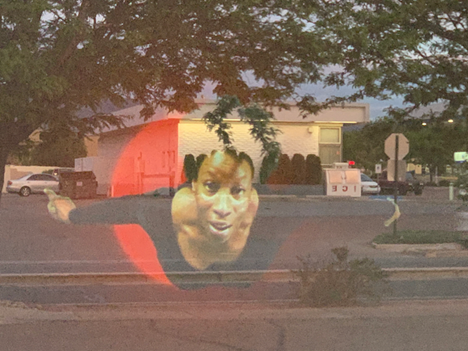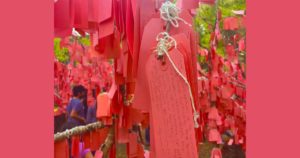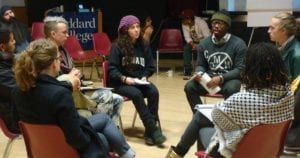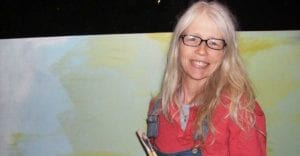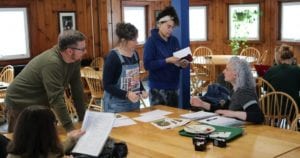
I wanted to share a few stories. One of them involves tea and a plate of buttered toast. Mostly, and exclusively, they are stories of sexual harassment and abuse in the context of academic workplaces I am no longer a part of. Writing this blog post, I couldn’t, at times, say clearly even to myself whether or not “sexual harassment” or “abuse” were the right words. There is a queasiness to telling these stories that I want to preserve, a contraction of the soft tissue around my own internal organs. What it is to share anecdotes of this nature, but also what it is to write them down. “What are the consequences of silence?” That was one of the first questions I asked as a writer in the U.S. Perhaps now my question might be: “What are the consequences of speaking up?” Let’s see how it goes.
Story 1:
Throwing away junk mail, I see a notice from a well-known poetry organization in San Francisco, advertising a reading with a — male professor, a poet — who I was once part of a group mediation with. No, it wasn’t a mediation. Seven female faculty and staff members had met with Human Resources to detail instances during which they had felt: predated: upon: by this male professor/poet. Because all the instances in question did not have practical witnesses, no further action was taken. The male professor/poet was moved to another department, in which he taught one of the classes for his annual “load,” and this is where (in this other department) he participated in faculty meetings, student mentoring, etc. There were countless stories of how this professor had, over the years, hit on/had sex with students. He began a relationship with an undergraduate student, for example, the day after the seminar she was in (his) had ended. It could not be proven, he said, that they hadn’t fallen in love with each other that very day and that prior to his day, the day after the seminar had ended, nothing had come to pass. Is this latter example an example of sexual harassment? No. Last week, I was in a faculty-wide meeting. Some years, perhaps three or four, had passed since the ill-fated conversations with Human Resources. The male professor/poet was now the chair of a committee of some kind, with faculty peers who did not, perhaps, retain any institutional memory of the question of sexual misconduct or harassment. All at once, he was delivering a committee report. No, I thought. And stood up. And went to the buffet table that had been set up for the meeting, and helped myself to a gluten-free scone with butter and jam. I took a cup of coffee with cream, and casually walked out of the meeting. In the corridor outside, I felt as if I had committed a minor crime. I felt guilty.
Story 2:
A university photographer, a man, once said to me, as he was taking my photograph for a marketing catalogue: “Now that you are no longer beautiful and don’t have your ego in the way, are you able to focus on your work?” I can’t remember what I said. I walked away and sat trembling on the back step of an abandoned building on campus, embarrassed. Later, at home, still thinking about it and unable to shake the feeling of being somehow exposed to view, I made myself a cup of tea and ate a slice of buttered toast, in my own personal re-enactment of the Chronicles of Narnia. I am not sure it worked. This moment – being told how beautiful, or how ugly, I am, in a university setting – has recurred with regularity. I remember writing to the Provost about the experience with the photographer; I did not receive a reply. I wrote to Marketing, and asked that no photographs ever taken of me by this photographer ever be used.
Story 3:
A graduate student sent me an email after his first class with me, during which I didn’t get his Leonard Cohen reference, something that angered him: “What if you were raped? What if your son saw you being raped and then chopped up and put into a stew and people ate you and all of this happened during a war?” I immediately forwarded this email, which combined images of sexual dismemberment with cannibalism, to the Chair of my department. The Chair called me in for a meeting. He said: “Can you sit down and talk this through with [the student]?” He articulated an approach to the situation which was grounded in principles of non-violent dialogue. He brought attention to the need for compassion for the male student, who had, that very morning, written an apologetic email citing the consumption of alcohol and the fact that he had served in the Iraq war. I am not sure if I was able to drink any tea after this one. My stomach turned whenever I thought of the email. I couldn’t stomach bread of any kind. The Chair of my department had suggested something similar (a restorative sit-down, face to face) when I brought the chronic plagiarism of another graduate student to his attention. In both cases, I said no. I said no to sitting down.
Story 4:
A male professor asked me out on a date. I said no. He began to stare at me whenever he saw me on campus. I felt uncomfortable; I began to find new routes around campus. Finally, I walked into his office and said: “You have to stop.” To his credit, he did. I remember he was drinking an Odwalla green juice. Small details, peripheral to the scene, accrete.
Story 5:
Another male professor, an adjunct faculty member, asked me out on a date. I said yes. That evening, he said, after a lovely dinner: “Something below the level of my unconscious wants to discharge a long-held karmic imprint. May I strike you?” I did not expect that with all his force he would punch me in the side of my head. I calmed down. I got him to the door. I said goodbye politely. He was very warm. He kissed me goodbye. I understood that he would never cross the threshold of my home ever again. I never told anyone about this. Some years later, he was hired as full-time faculty member. My limbs froze when he hugged me hello next to the buffet table, where my plastic fork was poised above the elegant, curated plate of local and tropical fruits. “Hello again,” I said, my blood dropping to my feet.
*
I could go on. These are the first few examples that came to mind when I reflected on my experience as a woman, a professor, in academia. Race feels a part of these depictions too. How does whiteness circulate through these anecdotes? What happens when you complain? Lately, I’ve been reading the blog of Sara Ahmed, her writing on sexual harassment, and the process of making a complaint. This paragraph from a recent blog post stood out to me: “My study of complaint has already taught me so much about how power works. It has taught me how abusive behaviour is understood as a way of framing a situation (rather than as a situation). Those who identify an abuse are understood as having a point of view. That might seem generous; but in fact it is not. Abuse is narrated as a conflict between sides; your side; my side. It is a way of neutralizing the situation because sides are assumed to be equal; to become a side is to be given the right to be treated as equal.” https://feministkilljoys.com/2017/11/05/the-figure-of-the-abuser/
*
I want to say #metoo, but I like Ahmed’s tag, #youtoo. She dedicates her blog post to students “fighting fiercely to topple the system.” At a time in which so many people are looking directly at the industries in which they work and articulating experiences of sexual harassment and abuse, I thought I could begin that dialogue here, though my own perspective is a limited to my social location. How can we share stories (that include race, gender and ability, in particular) about the lived experience of navigating the spaces of a university? How can we focus on the literary communities we are a part of (which so often in the U.S. have links to academic trainings/venues)? If we have a teaching practicum that is part of the requirement at Goddard College, then we are asking our students to show up in spaces that could be academic ones: the kinds of creative writing jobs that are housed in colleges of all kinds. Some quick questions: Is the MFA in creative writing a kind of industry? What is the discrepancy between what a university says it will not tolerate and what bodies actually receive: as imprints, messages and blows? If we tell a story about the body, do we experience relief? I suppose I will only know the answer to this last question when I complete this blog post.
Then make a cup of chai.
Then re-read for the mistakes I have, perhaps, made.
And then press click.
So that when it is published, later today.
I can assess.
The risk I have taken.
In saying these things.
Aloud.

